 | | Relations betwixt the U.s. and Nippon, strained in the 1930s over Japan's foreign policy in Mainland china and the resulting failure of Roosevelt to invoke the neutrality deed, but worsened in 1940 and 1941. In July 1940, the American government placed an embargo on all scrap iron, steel, high octane gasoline, and aviation lubrication oil going to Japan. On September 27, 1940, Japan signed the Tripartite Pact with Germany and Italian republic, making them allies. On January vii, 1941, U.S. Administrator to Japan Joseph C. Grew in Tokyo warned his superiors, "There is a lot of talk around boondocks to the issue that the Japanese, in case of a break with the U.Due south., are planning to go all out in a surprise mass attack at Pearl Harbor. I rather guess that the boys in Hawaii are | | non precisely asleep." Though it's clear now that America was on a path toward war with Nihon throughout the 1940s, no 1 really expected any attack east of the Philippines. Hawaii, not still a state, was to Americans a dreamy paradise in 1941. The about popular movie made nearly Hawaii up to that time was Waikiki Wedding ceremony (1937), starring Bing Crosby. Full of grass skirts, palm trees, and sweet Crosby crooning, Waikiki Wedding helped crystallize in the minds of many Americans the epitome of Hawaii as a carefree paradise. Later, during the war years, a medley of the songs from this flick would be sung again by Bing Crosby on a V Disc. Waikiki Wedding is referred to in the medley introduction every bit, "A foolish fable of those faraway times." The songs beneath help show the full disconnect between the reality of state of war and tragedy that was presently to unfold on that Pacific island paradise. | | | | Images of Hawaii as a paradise prevailed right up until the Japanese attack. In March 1941, Sammy Kaye recorded "Hawaiian Dusk," yet another interpretation of Hawaii as a tropical, romantic paradise: Hawaiian Sunset, soft shadows falling,
The hush of twilight, and lovely y'all.
Hawaiian Sunset, I hear it calling,
and in the dusk I'll come to you lot. Even the cover of the canvas music evokes beauty, dearest, peace. | | | | Johnny Noble made a career out of promoting Hawaiian-themed music to the American mainland in the 1920s and 1930s. His vocal, "It'southward Heaven in Hawaii," also released in 1941, would be one of the very last of its kind: It's Heaven In Hawaii
The palms are swaying as you and I are straying
beside a silver body of water
Information technology's Heaven In Hawaii On December 7, 1941, 350 Japanese planes launched in ii waves from six aircraft carriers attacked the American navy and army facilities on Oahu, killing 2,400 Americans and forcing America into a war. | | | | Song titles and lyrics about the attack on Pearl Harbor and America's entry into the War are oftentimes vicious and full of themes of violence. Intense contest among sheet music and tape producers in Manhattan'south Can Pan Aisle meant that songs were | | written and rushed into production days or fifty-fifty hours after the attack. These songs thus captured the raw anger, humiliation, and feelings of betrayal that about Americans felt nigh Pearl Harbor. The attack as well made it socially adequate to express these emotions in ways that took on not just connotations of nationalism and patriotism, but as well of race. Though his was not the first vocal penned following the attack, composer Charles Tobias's vocal "Nosotros Did It Earlier (and We Tin can Practice it Again)" was the first to receive air play, thanks to his blood brother-in-constabulary vocalizer Eddie Cantor, who performed the song on his radio diversity prove Midweek night, December 10 . More than upbeat and less vicious than many that would follow, the song was a reminder of the country'south try to make the world safe for democracy a generation before, and an acknowledgment of the piece of work that lay ahead; work that could possibly take as many as x years to terminate. Uncommonly popular, the song was recorded by multiple artists, including Carl Hoff and his Orchestra (with vocals by The Murphy Sisters), Dick Robertson, Barry Wood, Clyde Lucas, and Eddie Howard. | | | 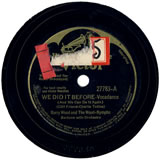
 "We Did Information technology Earlier" by Barry Wood (1941) "We Did Information technology Earlier" by Barry Wood (1941)
| 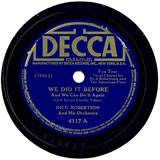
 "Nosotros Did It Before" by Dick Robertson (1941) "Nosotros Did It Before" by Dick Robertson (1941) | 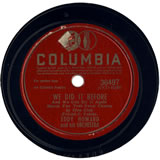
 "We Did Information technology Before" by Eddy Howard (1941) "We Did Information technology Before" by Eddy Howard (1941) | 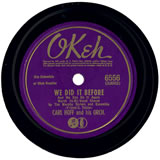
 "We Did It Before" by Carl Hoff & Murphy Sisters (1941) "We Did It Before" by Carl Hoff & Murphy Sisters (1941) | 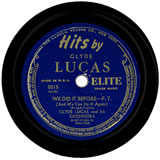
 "Nosotros Did It Before" past Clyde Lucas (1942) "Nosotros Did It Before" past Clyde Lucas (1942) | | | New York composers were practically tripping over each other trying to become their (sometimes) hastily conceived works published. Some forgettable submissions included "Allow'southward Have a Rap at the Japs," "Taps for the Japs," "Nosotros've Got To Do a Job on the Japs, Babe," "Oh, You lot Piddling Son of an Oriental," "When Those Little Xanthous Bellies Meet the Cohens and the Kellys," "We'll Knock The Japs Correct Into The Laps of The Nazis," (a weak endeavour at waging a ii-front war in a single song), and "We're Going to Detect a Fellow Who Is Yellow and Vanquish Him Scarlet, White and Blue." In an human activity of selective racism, one submission, "The Japs Haven't Got a Chinaman's Risk," was renamed "The Japs Oasis't Got a Ghost of a Gamble," out of sensitivity over America'due south Oriental allies. In an era of overt racism, there were at present adept Orientals and bad Orientals. | | | Information technology's adequately well known now that most Americans did non know what "Pearl Harbor" was before December 7, 1941. After Dec 7, anybody knew, and the place was quickly immortalized in the battle cry, "Remember Pearl Harbor!" Within days songs appeared invoking the name. An advertisement in the December 17 issue of the show business periodical Diversity proclaimed, "America Will Never Forget...WE'LL E'er Recollect PEARL HARBOR...The Song the Waves Are Singing Along Hawaiian Shores." This song, pictured to the correct, was written by Alfred Bryan, Willie Raskin, and Gerald Marks and published by Mills Music. Several competing versions of the vocal were also in the works, well-nigh notably Don Reid & Sammy Kaye's version, the title shortened to but "Remember Pearl Harbor." A third version was penned by Johnny Noble, the composer mentioned above with a catalogue of Hawaiian-themed songs. A fourth version with racist lyrics was written past Frank Luther and recorded by Carson Robison. | | | | In January, Bing Crosby recorded "Remember Hawaii," and "Sing Me a Song of The Islands", both much more than cornball in nature. Their relative obscurity today is maybe indicative of a failure to realize at the fourth dimension that things had changed. Of all the Pearl Harbor-titled songs, the Don Reid/Sammy Kaye version became the almost popular. Kaye recorded the song only 10 days after the attack. With its patriotic lyrics (devoid of whatever racism), and its powerful, driving music, it is truly a tour de forcefulness of Large Band sound, fondly remembered today by the World War 2 Generation. Reid/Kaye versions of "Remember Pearl Harbor," with slight lyric variations, were made by Eddie Howard, Charlie Spivak, Duke Daley, and Dick Robertson. | | | 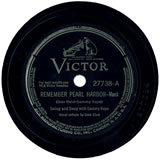
 "Remember Pearl Harbor" (Reid) by Sammy Kaye (1941) "Remember Pearl Harbor" (Reid) by Sammy Kaye (1941)
| 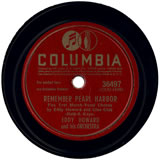
 "Remember Pearl Harbor" (Reid) by Eddie Howard (1941) "Remember Pearl Harbor" (Reid) by Eddie Howard (1941) | 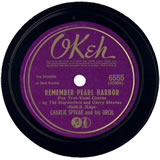
 "Think Pearl Harbor" (Reid) past Charlie Spivak (1941) "Think Pearl Harbor" (Reid) past Charlie Spivak (1941) | 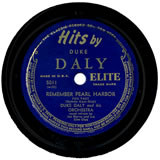
 "Think Pearl Harbor" (Reid) by Duke Daly (1941) "Think Pearl Harbor" (Reid) by Duke Daly (1941) | 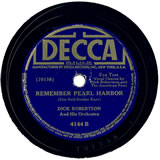
 "Remember Pearl Harbor" (Reid) by Dick Robertson (1942) "Remember Pearl Harbor" (Reid) by Dick Robertson (1942) | | | About of the other Pearl Harbor-inspired songs are much darker, more violent, and frequently overtly racist. America had been taken by surprise at Pearl Harbor. Worse, the Japanese has not conducted themselves in accordance with Western notions of "fair play". Negotiations in Washington were ongoing. Admiral Kichisaburo Nomura, the Japanese Ambassador to the United States, and special envoy Saburo Kurusu had arrived at Secretarial assistant of State Cordell Hull'south office an 60 minutes later on the assail began with a letter of the alphabet officially breaking off negotiations. As President Roosevelt noted in his December 8 address before Congress, "The distance of Hawaii from Japan makes it obvious that the assault was deliberately planned many days or even weeks ago. During the intervening time the Japanese Regime has deliberately sought to deceive the United States by false statements and expressions of promise for continued peace." The Japanese admiral who had planned the set on, Isoroku Yamamoto, was familiar with ancient Chinese military theorist Lord's day Tzu'due south Fine art of War, in which he alleged, "If the enemy opens the door, you must race in...when the enemy opens the door--be like a fleeing rabbit. The enemy will be unable to withstand you." Furthermore, Japan had begun all of their modern wars with a surprise assault. This tradition enabled Yamamoto to successfully argue for the preemptive strike. The late delivery of the letter of the alphabet to Secretarial assistant Hull, the "sneak set on," and the filibuster of a formal annunciation of war until the evening of December vii made the Americans feel they had been stabbed in the back. The atrocities committed by Japanese soldiers in Cathay were well known, but in the early months of 1942 there would be more, this time perpetrated confronting America and her allies. To Americans, these were not the actions of a civilized people. Many Americans were angry and wanted revenge. | | Ii recordings most notable for their themes of revenge and acrimony appeared on sides A and B of a December 1941 Bluebird release by Carson Robison. This performer had earned a living and reputation equally a cowboy and hillbilly artist throughout the 1920s and 1930s, spending many of those years working with Vernon Dalhart. His most prolific years were before 1930, but with the attack on Pearl Harbor, Robison found a temporary niche as a novelty song artist. Robison's version of Frank Luther'due south "Think Pearl Harbor," while emphasizing the sneak attack, manages to phone call the Japanese "rats," "vultures," and "yellow scum" (no longer deserving of existence considered our "little brown brothers"). Twice he advocates killing all Japanese, managing in the last verse to invoke both organized religion and the patriotic duty of all Americans to help back up the war effort past ownership more state of war bonds. On the B side is a rather amazing anti-Japanese recording, "We're Gonna Have To Slap The Dirty Little Jap (And Uncle Sam's The Guy Who Can Do It)," written by Bob Miller. This vocal, as well refers to | | | the Japanese as "yellow." While this is undoubtedly a reference to the "cowardly" human action of a sneak attack, information technology also seems clear that apply of the give-and-take is role of the common race caricature of Japanese seen throughout the war. Fifty-fifty the sheet music is yellow. The Carson Robison version of this song did not include the third poesy. However, that poetry was included in a version recorded by Lucky Millinder on February 18, 1942. The remaining releases with "Pearl Harbor" every bit part of the championship were, "Cowards Over Pearl Harbor" by Denver Darling; "Pearl Harbor Dejection," by Physician Clayton; and "Wasn't That An Awful Time at Pearl Harbor?," by the | | | | Selah Jubilee Singers. Darling's melancholy land song is unusual in that information technology is somewhat devoid of anger. Rather, the narrator is saddened how the attack has spread the war to the rest of the globe. The dishonor of the sneak set on is emphasized, and he questions what the Japanese adults will tell their children. The narrator also questions how the Japanese will explain their deeds come judgment day, and one gets the impression that whatever their caption, information technology will not be satisfactory. Doc Clayton's vocal is an African American blues masterpiece, with gripping piano work and moody, | | | contemplative lyrics. Clayton points out how frustrating it is that the United States sold scrap iron to the Japanese for years before the embargo of 1940. The vocal also perpetuates the stereotype that the Japanese are not "hard fighters." By the cease of the war, Americans would have to acknowledge that the Japanese did indeed fight ferociously. | | Perhaps the most often used rhyme in the anti-Japanese songs of WWII is that of rhyming "Jap" with "sap." The give-and-take sap has somewhat fallen out of use today, but information technology refers to someone who is a dupe, who is gullible and can easily be convinced to practice the behest of others. While information technology may be that the rhyme was obvious enough to provide an easy insult, information technology's also truthful that function of the American stereotype of the Japanese at the time was that they were non clever enough to have independently conceived of, or carried out a plot as large equally Pearl Harbor. Indeed, radio commentary on the day of the attack revolved effectually speculation that the Japanese were actually doing the bidding of the Nazis, that the assault was role of Hitler's one thousand strategy to provoke the U.Southward. into declaring state of war on Germany. Rumors even surfaced, and were published in American Newspapers, that High german ships and pilots had participated in the attack. More than half of Americans believed this myth until documents captured in Germany in May 1945 proved otherwise. The most ubiquitous use of "sap" was in the song, "You're a Sap, Mr. Jap." Written by James Cavanaugh, John Redmond, and Nat Simon, information technology was recorded by Carl Hoff on December 23, with vocals past The Murphy Sisters, and by Dick | | | | "You're a Sap, Mr. Jap" was one of the showtime songs written after Pearl Harbor. Another, written on December vii, was Sam Lerner's, "The Sun Will Soon Be Setting (For The Country of The Ascension Sun)". While Lerner gets credit for being the first to use Japan's motto of "The State of The Rise Sun" against her (equally well every bit the first to strike a accident for Capitalism), he besides gets credit for what is perhaps the about ludicrous of all WWII rhymes: They came while we slumbered like a thief in the night
But their days will be numbered by the mighty right of our dynamiteA more than intriguing song was " The Son of a Gun Who Picks on Uncle Sam." Written by Yip Harburg and bundled by Burton Lane, it was possibly a little ahead of its fourth dimension by | | | | acknowledging that, though America is a country of many different factions, those factions set aside their differences when it comes to national pride and defense. It was written in December 1941 and recorded past Carl Hoff, with vocals by The Murphy Sisters. The song was featured as the finale in Panama Hattie (1942), the film version of the Cole Porter musical. | | Though the Japanese started the state of war, one of the mutual themes in WWII music is that information technology would exist America who would finish it. A few songs were quite prophetic. I of these is the amazingly racist "In that location'll Be A Little Smokio In Tokio," performed past Don Baker. The AHC could not observe a release date for this Continental recording, but it seems likely to have been earlier the Doolittle Raid on April 18, 1942, when there was indeed a niggling fume over Tokyo. That smoke would pale in comparison to the amount that would be generated in 1945 when the metropolis was firebombed several times by American war planes. Some other song The AHC was not able to discover the recording appointment for is "Bomb Tokyo" by Music Operator Band. This too was probable recorded earlier the Doolittle Raid, as it makes reference to Americans fighting in the Philippines. | | | Some other prophetic vocal was "They Started Somethin' (But Nosotros're Gonna Cease It!)." Written in December, 1941, it was recorded by Kate Smith on December 16 and contained these lyrics: Oh! They started somethin'
But nosotros're gonna finish it
Right in their own back yard! Of course, America did end the state of war with the dropping of the 2 atomic bombs on the Japanese cities of Hiroshima and Nagasaki on August 6, 1945, and Baronial 9, 1945, respectively. | | | | | | Ane of the more infectious melodies of the entire State of war was the song "Bye Mama (I'm Off To Yokohama)", in all of its variations. Written past J. Fred Coots, it contains a few of the cleverer rhymes. While many a vocal came up with obvious rhymes for the word "Jap," Coots was a petty more than ambitious with his rhyming of "mama" with "Yokohama," and especially with this one:
A million fightin' sons-of-Uncle Sam, if yous delight, Volition shortly have all those Japs right down on their Japa-knees
| | | | Many artists recorded "Goodbye Mama," with several variations in lyrics; including Frankie Masters, Teddy Powell, Dick Robertson, Duke Daly, Fine art Jarrett, and Orrin Tucker. The remaining songs below all comprehend the concepts of national readiness and mobilization in some way. Though many of them are patriotic in nature, the AHC made the decision to create a split department for WWII songs that emphasize patriotism over all other subjects. These concluding few songs were all written inside a few months of the Pearl Harbor attack and seem to have been written in response to that singular result, rather than the war as a whole. | | | 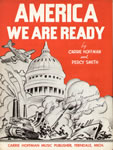
Sheet Music: "America Nosotros Are Prepare" (1942)
| 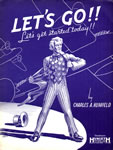
Canvas Music: "Let'southward Become!! Let's Get Started Today!!" (1942) | 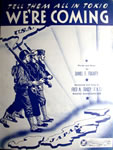
Sheet Music: "Tell Them All In Tokio We're Coming" (1942) | 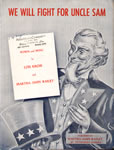
Canvas Music: "We Will Fight For Uncle Sam" (1942) | 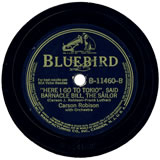
 "'Here I Go To Tokio' Said Barnacle Bill The Sailor" by Carson Robison, (1942) "'Here I Go To Tokio' Said Barnacle Bill The Sailor" by Carson Robison, (1942) | 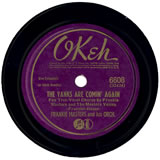
 "The Yanks Are Comin' Again" by Frankie Masters (1942) "The Yanks Are Comin' Again" by Frankie Masters (1942) | 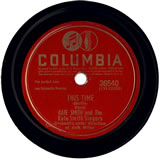
 "This Time" by Kate Smith (1942) "This Time" by Kate Smith (1942) | 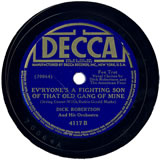
 "Ev'ryone's a Fighting Son of That Former Gang of Mine" by Dick Robertson (1941) "Ev'ryone's a Fighting Son of That Former Gang of Mine" by Dick Robertson (1941) | 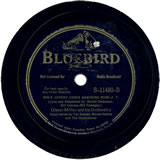
 "When Johnny Comes Marching Dwelling" by Glenn Miller (1942) "When Johnny Comes Marching Dwelling" by Glenn Miller (1942) | | | | | | top | | 
| | | |  | |  |  | | 


















0 Response to "All Over Again Lyrics Pearl Harbour"
Post a Comment